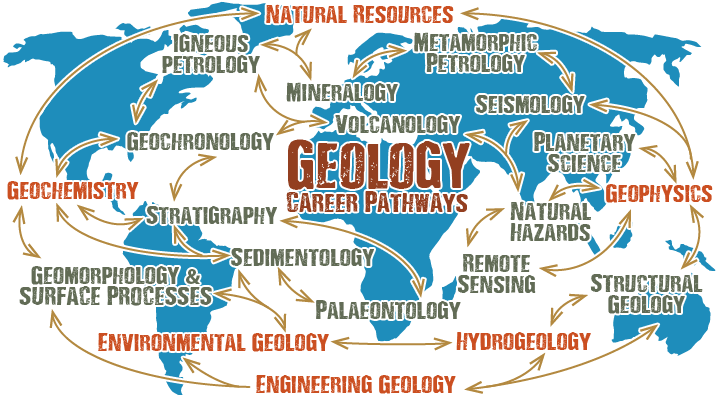Subject Areas
Geology is an over-arching term for a diverse range of different fields of study. These fields focus on a more specific aspect of the Earth or the solar system (such as volcanology or sedimentology) and use aspects of mathematics and the other sciences. For example, palaeontology overlaps extensively with biology and remote sensing uses physics to investigate the Earth above and below ground.

Below is a list, with short descriptions, of some of the major fields of study within geoscience.
 |
Engineering geologyA broad discipline encompassing the construction of buildings and dams, slope stability, mine and quarry design, tunnelling, roads, railways, coastal defences and many other aspects of the built environment. |
 |
Environmental geologyThe application of geological principles to mediating or solving environmental problems of water and land in or on which people, animals and plants live, that resulted from human activities or natural processes. |
 |
GeochemistryExplores the chemical composition of rocks and fluids and the chemical processes operating within the Earth and on its surface. |
 |
GeochronologyThe study of determining the age of rocks, fossils and sediments. Absolute geochronology uses radioactive isotope systems, whereas relative geochronology uses palaeomagnetism and stable isotope systems. |
 |
Geomorphology / Surface ProcessesThe scientific study of the origin and evolution of features formed by chemical and physical processes on or close to the Earth's surface. |
 |
GeophysicsThe study of the physics of the Earth, such as its internal structure, earthquakes, gravity and geomagnetism. It can be deep (aiding understanding of the Earth’s core) or shallow, helping to survey archaeological sites. Geophysics is used to search for oil and mineral deposits. |
 |
HydrogeologyThe branch of geology concerned with underground and surface water, its movement, behaviour and quality. |
 |
Igneous PetrologyThe study of igneous rocks that formed from magma or lava. |
 |
Metamorphic PetrologyHow rocks are affected by heat and pressure to produce the range of metamorphic rocks and minerals. |
 |
Natural hazardsThe features and effects of phenomena such as earthquakes, landslides, floods, volcanoes etc. and the importance of forecasting, resilience and minimisation of damage. |
 |
Natural resourcesThe major sources of energy are oil, coal and natural gas, but uranium and alternative sources such as geothermal energy are also areas of employment for geologists. Mining and quarrying are used to extract metals and minerals with applications from agriculture to high-tech industry. Explore careers in mining & quarrying, energy and water resources |
 |
OceanographyIncludes ocean chemistry, ocean floor geology, meteorological oceanography and the study of climate change, as well as ocean waves and currents. |
 |
PalaeontologyThe study of fossils, from dinosaurs to microorganisms. How organisms are preserved in the rock record, and their importance as indicators of past environmental change. |
 |
Planetary scienceThe study of the geology of other celestial bodies (such as planets and asteroids) in our solar system and beyond. |
 |
Remote SensingThe use of aerial sensor technologies to detect and classify objects on Earth by means of imaging from satellites or aircraft. This is useful in many fields, from exploration for resources to geological mapping of the Earth or other planets or monitoring geological hazards. |
 |
SedimentologyThe study of sediments, how they accumulate, how they become sedimentary rocks, information they provide about past environments and their significance to energy and other resources. |
 |
SeismologyThe study of seismic waves passing through the Earth from earthquakes, explosions or controlled sources, which can be used to predict earthquake hazards, map planetary interiors or explore for resources. |
 |
StratigraphyThe study of the order, nature and rates of change of geological events and processes. This is related to geological mapping of rocks exposed at the Earth's surface. Stratigraphy helps to determine the ages and field relations of rocks to construct geological maps and databases. |
 |
Structural geologyConcerned with rock movement and deformation by folding and faulting, including the study of plate tectonics. How rocks respond to stress, both natural and man-made. |
 |
Unconventional energyThis sector includes geothermal energy, wind power and tidal power. Sustainable energy sources is a growing area. |
 |
VolcanologyThe study of volcanoes, their location, formation and prediction, types of eruptions, and the sorts of rocks produced, plus associated hazards/societal impact. |



